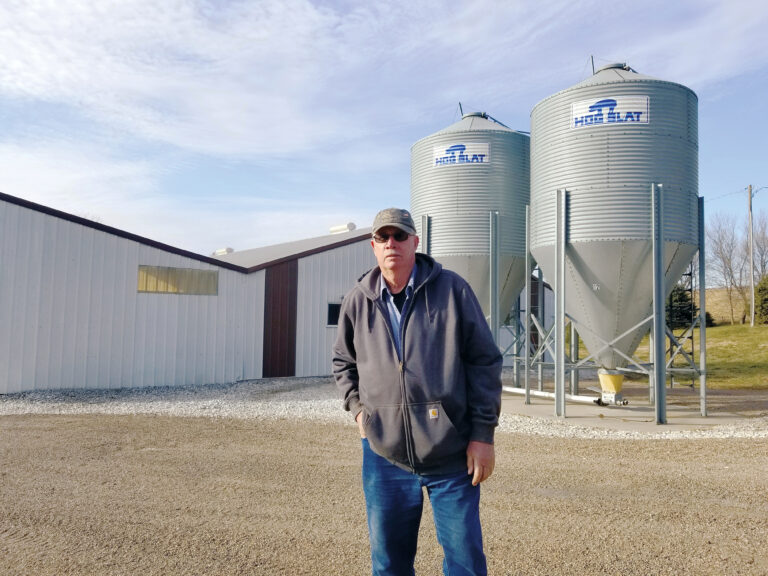“I Can’t Believe You Have a Hog Barn Here”
Why Iowa Farmer Richard Rosener Switched to Manure Master™ Plus
If you’ve ever driven north of Vail in western Iowa, it seems like there’s a surprise just over every hill. In a landscape untouched by the last glacier that scraped across parts of Iowa thousands of years ago, those hills almost hide Richard Rosener’s farm from a distance.
As you get closer to the Rosener farm, however, you notice the well-kept buildings, neatly mowed grass and modern hog barns. But there’s one thing you won’t notice—hog manure odor. That’s no accident, says Richard, who raises corn and has custom fed hogs since 1983. “My barns are just down the hill from our house, so odor control is a big deal.”
The challenge
Richard is the kind of guy who pays attention to detail, from the right amount of rock around his barns for rodent control to odor management at his hog complex, which he built in 1998. The site includes two barns with a total of 1,200 hogs. He pumps out his swine manure pit twice a year and applies the manure to his fields.
“It bothers me to no end when I smell strong odors from a hog farm,” Richard says. “I want to be able to walk into my barn without smelling overpowering odor. I also don’t want it to stink when I apply manure to the fields.”
While Richard tried a variety of additives through the years to control manure odor, with varying results, there was room for improvement. “The manure always smelled for a few days or a week after I applied it,” Richard said. “I don’t want people to drive down the road and say, ‘That place smells terrible.’”
The solution
When Richard attended the Farm News annual farm show a few years ago in Fort Dodge, Iowa, he listened to a manure management/odor control seminar by Dr. Jim Ladlie, president of ProftProAG in Albert Lea, Minnesota. Ladlie’s focus on harnessing the power of microbes to reduce swine manure odor resonated with him.
“For the last 19 years I’ve done tests with Iowa State University on how micronutrients impact soil fertility and crop yields,” Richard says. “Since 1978, I’ve also been interested in the role of microbes in agriculture. Microbes are so important.”
Jim talked about Manure Master Plus, a biological manure additive made up of an array of microorganisms that control odor, reduce crusting and solids and ward off flies and other insect pests.
“Jim is sharp, and his information makes you think,” said Richard, who decided to try Manure Master Plus next time he pumped manure from his pits.
The results
Richard started using Manure Master Plus in 2019. “It’s simple to use,” notes Richard, who pours the product into the manure scraper system in his barns.
Since he started using Manure Master Plus, Richard hasn’t had a buildup of solids in his pits. “When you pump out the manure, it pumps right down to the concrete,” he adds. “It’s a lot different than those farmers who say their pit only holds half of what it used to, because of all the solids building up.”
Odor has been a non-issue, as well. “After using Manure Master in my hog barn pit, there was no odor present when I emptied it last spring and this fall,” Richard says. “For 22 years, I used another product for odor and solids, but this product is far superior.”
What pleases him most? When people visit his farm and say, “I can’t believe you have a hog farm here.”
ProfitProAG recommends using 40 gallons of Manure Master Plus per 1 million gallons of manure annually. When starting treatment, use 15 gallons per 1 million gallons of manure. This first treatment should occur two to three weeks after spring or fall pump-out, when the pit/lagoon is at its lowest capacity and fresh manure has accumulated. Following that, use 2.5 gallons of Manure Master Plus per 1 million gallons of manure each month for 10 months.
“I’m looking forward to seeing what this product can do for soil fertility and the other things Jim promises,” Richard adds.
With his inquisitive mind and focus on continuous improvement, Richard is always interested in practical solutions that benefit his farm. “Just having a tractor doesn’t make you a farmer. You’re only a farmer if you keep on learning and improving every year.”
The predominant organisms in Manure Master Plus manure technology are the purple sulfur group. This bacteria consortium is divided between two major categories: purple sulfur and purple non-sulfur organisms. The purple sulfur bacteria (which includes Thiobacillus sp.) utilizes hydrogen sulfide as an electron donor and oxidizes the sulfide to elemental sulfur, which is temporarily stored intracellularly and released as sulfate.
Manure Master Plus technology incorporates a vast diversity of microorganisms to achieve an effective and natural biological solution to manure management problems.

